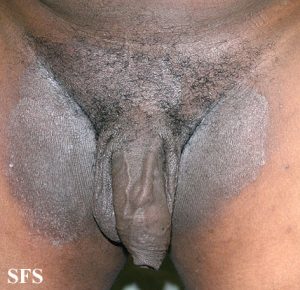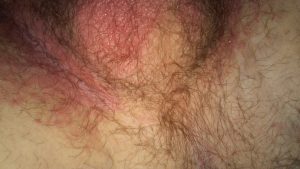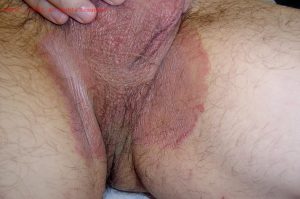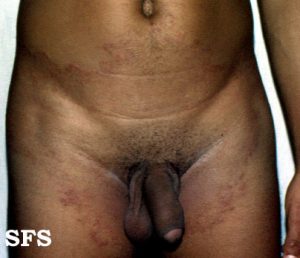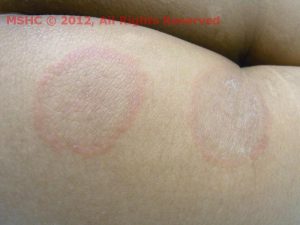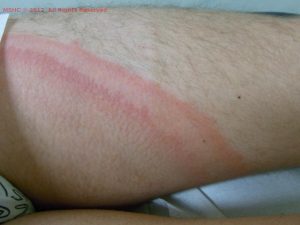This post is also available in:
![]() 简体中文 (Chinese (Simplified))
简体中文 (Chinese (Simplified)) ![]() ไทย (Thai)
ไทย (Thai) ![]() 한국어 (Korean)
한국어 (Korean)
Tinea cruris (jock itch) is a fungal infection caused by an overgrowth of microscopic fungi that live on your skin, hair, and nails. Tinea usually develops in warm, moist areas like the groin, inner thighs, skin folds and buttocks. The infection causes a rash that often itches or burns. The affected areas can also appear red, flaky, or scaly on light skin. On darker skin, the rash might appear grey or brown.
Tinea/jock itch is typically a mild infection, but is highly contagious. Treating it quickly will minimise symptoms and keep it from spreading. Topical antifungal creams and keeping the affected area clean and dry is often an effective treatment for tinea/jock itch.
Tinea/jock itch is most common in people with a penis, particularly adolescents.
Signs and Symptoms
Skin
- Itching and stinging
- Red, scaly rash or blisters
- Rash that gets worse with exercise or activity
- Rash that doesn’t improve, worsens, or spreads after using over-the-counter steroid cream (hydrocortisone)
- Skin cracking, splitting or peeling
- Changes in skin colour
Feet
- On the feet, tinea appears as scaling or cracking of the skin, particularly between the toes.
- Nails can also become discoloured, thickened, brittle and chalky.
Common Causes
Anything that gives the fungus a better environment to grow may trigger tinea / jock itch.
These triggers include
- Skin-to-skin contact with a person or pet with tinea
- Heavy sweating from exercise, sports, or hot weather
- Friction from tight clothing, or skin rubbing against skin
- Moist skin
- Sharing clothing, towels, or exercise equipment with others
- Using shared/communal showers
Prevention
There are several ways to reduce your risk of getting tinea/jock itch:
- Avoid skin-to-skin contact with any areas with a rash.
- Don’t share clothing, towels, or exercise equipment.
- Disinfect wet areas or sex/dungeon furniture.
- Regular hand washing.
- Keep your skin clean and dry, especially the area around your groin.
- Wash potential infection sites regularly with soap and water, and dry the area thoroughly.
- Applying baby/talcum powder can also reduce excess moisture.
- Avoid tight-fitting clothing and wear loose clothing in hot or humid weather.
- Wash any workout clothes or athletic supporters after each use.
- Treat athlete’s foot quickly because it is caused by the same fungi that cause jock itch. Avoid using the same towel on both your feet and groin until you no longer have symptoms.
- Wear thongs in communal showers or wet areas.
Testing
Here’s some information about testing for tinea/jock itch. You can view a list of sex worker-friendly sexual health clinics at our Where To Test page.
Testing Method
- Physical exam by a doctor/nurse (most likely)
- Testing a skin scraping from the affected area (this may help rule out other skin disorders)
When to Test
- If over-the-counter treatments do not get rid of symptoms
- If the rash gets worse with treatment
Other Info
- Although tinea/jock itch is not a serious medical issue, a doctor should look at any persistent skin rash to rule out other serious conditions
Treatment
In most cases, you can treat tinea/jock itch at home, but sometime you might need prescription treatments. Here’s what you need to know about treating it.
Treatment Method/s
- Antifungal creams (over-the-counter)
- Antifungal medication prescribed by a doctor (cream or oral medication)
- Wash the affected area thoroughly with soap and warm water.
- Keep the area clean and dry and air it as much as possible.
- Change clothes and undergarments every day.
- Wear loose, breathable clothing.
- Treat any other fungal infections, such as athlete’s foot.
Costs and Other Information
- Over-the-counter treatments generally cost less than $10.
- Oral antifungal medications may cause unpleasant side effects, such as upset stomach and headaches.
- You do not need to treat partners unless they have symptoms.
How might this impact my work?
Practical Considerations
- Cream treatment for tinea/jock itch can weaken condoms on contact
- Skin irritation from tinea/jock itch can be painful and may make touch or having sex uncomfortable
- Tinea/jock itch can be passed between you and your clients via skin-to-skin contact. Use barriers or offer alternative services if you are concerned about transmission or notice a rash on your or your client’s skin.

